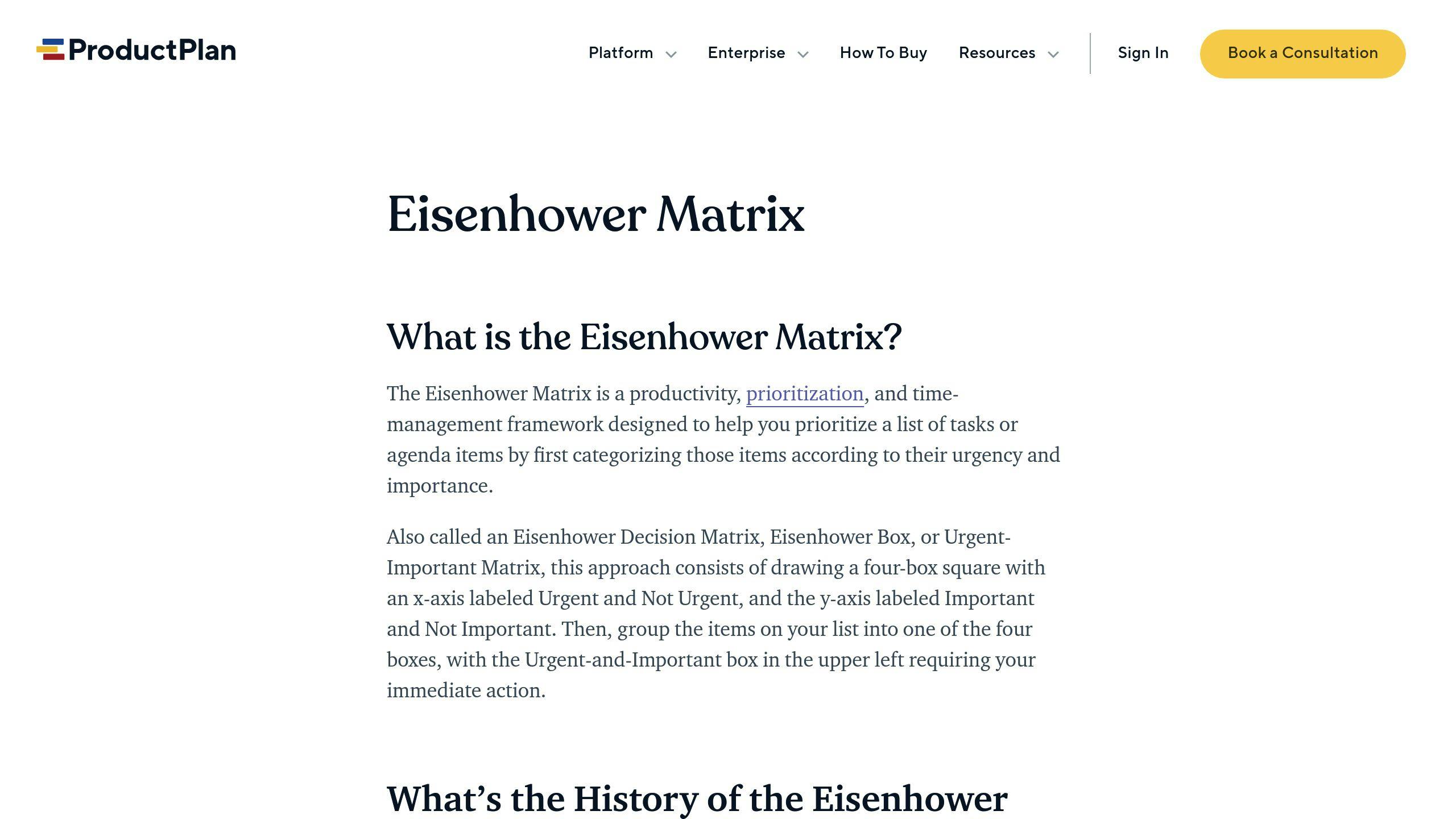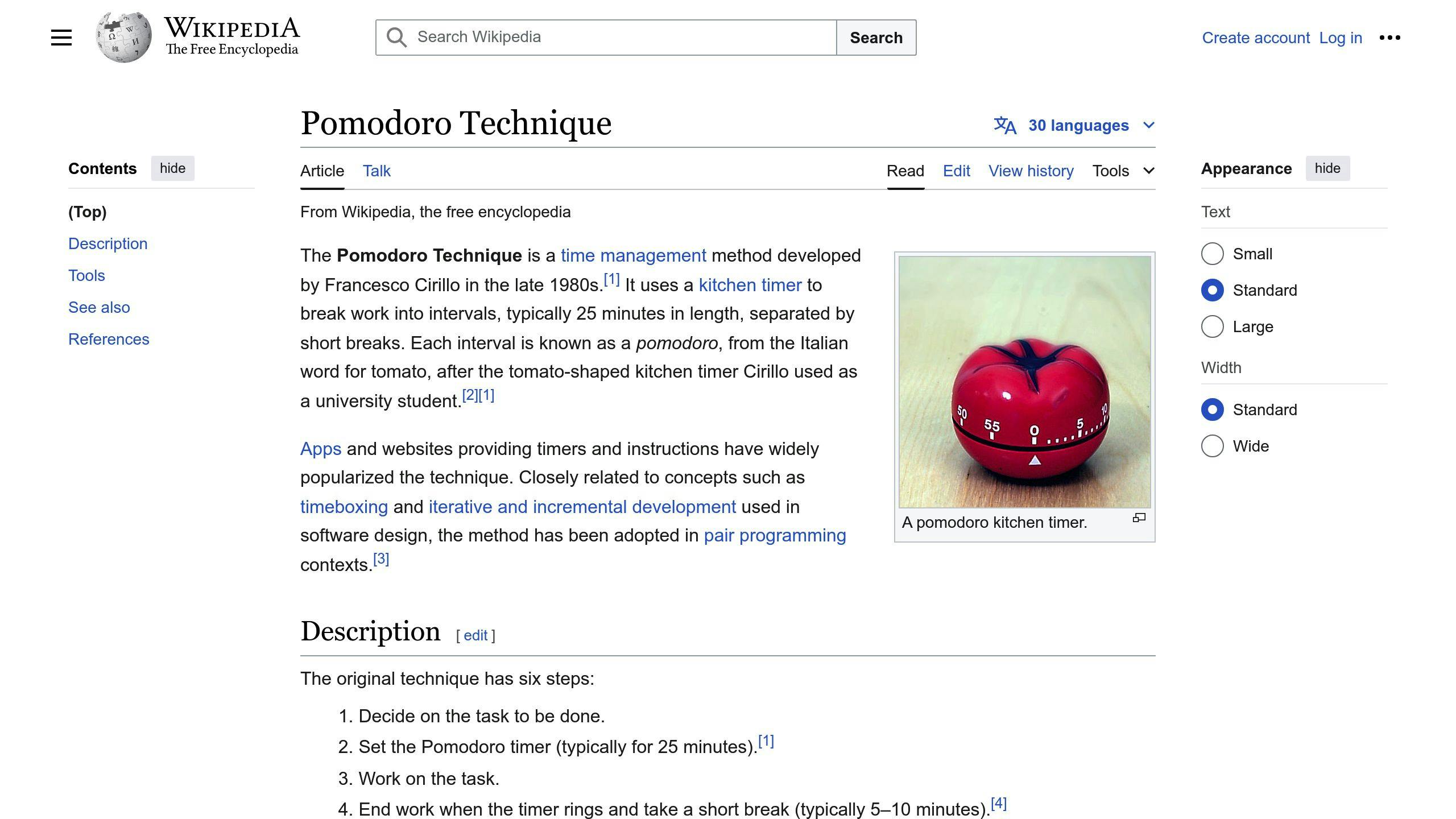Struggling to balance coding, deadlines, and learning new skills? You’re not alone – 73% of developers face burnout, and 36% feel dissatisfied with their work-life balance. This guide offers practical techniques and tools to help you stay productive, reduce stress, and create better work-life harmony.
Key Takeaways:
- Prioritize tasks: Use the Eisenhower Matrix to focus on what matters most.
- Boost focus: Apply the Pomodoro Technique for structured work sessions.
- Organize your day: Use time-blocking to allocate time for coding, meetings, and skill-building.
- Leverage tools: Apps like Toggl and Trello help track time and manage tasks effectively.
- Develop habits: Build daily routines around your energy levels to maximize productivity.
By mastering these strategies, you can deliver high-quality work, learn new technologies, and maintain a healthy balance – all without burning out. Let’s dive in!
Common Time Management Challenges for Developers
Managing Interruptions and Task Switching
Interruptions and frequent task switching can cut productivity by nearly 40%. For developers, this is especially problematic when working on complex tasks like coding and debugging. Things like unplanned meetings, instant messages, or switching between projects can disrupt focus, making it harder to get back on track and delaying progress.
Juggling Work and Learning New Skills
Developers today not only need to tackle their daily tasks but also keep up with evolving technologies and skills [2][4]. Platforms like KodNest offer a way to combine skill-building with practical applications, helping developers balance learning with their workload.
"Effective time management helps developers meet deadlines without sacrificing quality." – Cathy Reisenwitz, Clockwise [3]
Working with Tight Deadlines
Tight deadlines are often caused by factors like unrealistic time estimates, expanding project scope, or unresolved technical debt. These pressures can lead to stress and lower code quality. To handle this, developers need to prioritize tasks effectively and maintain open communication with stakeholders [3][4].
Using tools like prioritization frameworks and project management software can help teams monitor progress and set achievable goals right from the start of a project.
Now that we’ve outlined these challenges, let’s look at practical ways to tackle them.
Time Management Tips for Software Engineers
Effective Time Management Techniques for Developers
After identifying common challenges developers face, let’s dive into methods that can help tackle these issues and boost productivity.
Using the Eisenhower Matrix for Task Prioritization

The Eisenhower Matrix is a practical way for developers to sort tasks based on urgency and importance. It helps avoid getting stuck in reactive work while ensuring critical tasks are addressed.
| Quadrant | Type | Action | Example |
|---|---|---|---|
| 1 | Urgent & Important | Do First | Fixing production bugs |
| 2 | Important, Not Urgent | Schedule | Learning new skills |
| 3 | Urgent, Not Important | Delegate | Routine meetings |
| 4 | Not Urgent or Important | Eliminate | Scrolling social media |
Staying Focused with the Pomodoro Technique

The Pomodoro Technique is a simple yet effective way to stay focused, especially during demanding coding tasks. By working in short, concentrated bursts, you can maintain attention and avoid burnout.
Here’s how it works:
- Set a timer for 25 minutes and focus on one task.
- When the timer rings, take a 5-minute break.
- Repeat this cycle, and after four rounds, take a longer break of 15-30 minutes.
This structured approach helps developers maintain energy and focus throughout the day.
Scheduling with Time Blocking
Time blocking turns your calendar into a productivity powerhouse by assigning specific time slots for various activities. It’s especially useful for balancing coding, meetings, and collaborative tasks.
Divide your day into blocks dedicated to deep work, communication, skill-building, and buffer time for unexpected issues. Treat these blocks as firm commitments to minimize distractions and stay on track with your priorities.
sbb-itb-f454395
Helpful Tools for Managing Time
Developers today rely on tools to stay organized and manage their time effectively. Here’s a look at some key tools that can boost productivity and help with time management.
Tracking Time with Toggl and RescueTime

Time tracking tools are great for understanding how you spend your day. Toggl lets you manually log tasks and create detailed reports, while RescueTime works in the background, automatically tracking app usage to reveal trends in your productivity. These tools can help you:
- See how much time is spent on specific projects
- Identify patterns in your work habits
- Balance focus time and communication tasks
- Spot areas for improvement in your daily routine
Organizing Tasks with Trello and Todoist

Staying on top of tasks is easier with platforms like Trello and Todoist. Trello uses a Kanban-style board to visually track progress, while Todoist helps you manage even complex tasks with its structured approach.
Here’s how these platforms can help:
| Feature | How It Helps |
|---|---|
| Visual Workflows | Makes project progress clear |
| Priority Systems | Organizes tasks by importance |
| Deadline Tracking | Keeps timelines in check |
| Team Collaboration | Improves group productivity |
Both tools are simple to use, sync across devices, and are perfect for teams or solo developers looking to stay organized.
How KodNest Helps with Time Management

KodNest goes beyond technical training by integrating time management strategies into its programs. By working on real-world projects and using AI-driven mentorship, developers learn how to meet deadlines while building their skills.
What KodNest offers:
- Hands-on experience with managing projects
- Techniques for prioritizing tasks
- Training focused on meeting deadlines
- A balanced approach to learning and productivity
While these tools and platforms can offer immediate help, building strong time management habits is key to long-term success. Up next, we’ll dive into how to develop those habits.
Developing Long-Term Time Management Skills
Mastering time management is essential for developers, especially since 73% of software developers report experiencing burnout [1]. Building habits that stick requires a methodical approach and ongoing refinement of your strategies.
Creating Daily and Weekly Routines
Plan your schedule around your natural energy levels for better productivity. For example, use your most focused hours in the morning for complex coding, mid-day for meetings, and afternoons for learning or reviewing.
| Time of Day | Focus Area | Benefits |
|---|---|---|
| Morning Peak | Complex Coding Tasks | Greater focus, fewer distractions |
| Mid-Day | Meetings & Collaboration | Aligns with natural energy dip |
| Late Afternoon | Learning & Review | Improved retention, end-of-day wrap-up |
| End of Day | Planning | Prepares priorities for the next day |
Time-blocking can help maintain focus and cut down on the mental fatigue caused by frequent task-switching [1][4]. Once you’ve established a routine, regularly assess its effectiveness and tweak it as needed.
Improving Through Regular Feedback
Use time-tracking tools to evaluate how you’re spending your day and identify areas for improvement. Focus on metrics like:
- Time spent coding versus time spent in meetings
- Frequency of unplanned interruptions
- Percentage of planned tasks completed
- Energy levels at different times of the day
"Traditional time management courses aren’t suited for today’s worker" [3]
This underscores the need for tailoring strategies to fit your unique work style and challenges.
As projects and work environments shift, staying adaptable is key to maintaining productivity.
Adjusting to Changing Work Requirements
Research shows that 36% of developers face challenges with work-life balance due to shifting demands [1]. Adapting to these changes isn’t just about solving immediate issues – it’s a skill that supports long-term productivity and personal growth.
Here’s how you can stay on track:
- Reevaluate priorities regularly using proven frameworks
- Keep communication open with your team
- Build buffer time into your schedule for unexpected tasks
KodNest’s developer training programs integrate time management into real-world projects, giving developers practical experience in adapting their strategies. Their AI-driven mentorship ensures that as project complexities grow, developers can adjust their time management techniques effectively.
Conclusion
Time management is a crucial skill for developers navigating today’s fast-moving tech world. As the industry keeps shifting, refining this skill is essential for career growth and maintaining personal well-being.
Key Points to Keep in Mind
Good time management comes down to prioritizing tasks, using the right tools, and building strong habits. By combining methods like prioritization frameworks, focused work strategies, and productivity tools, developers can optimize their workflows while maintaining a healthy work-life balance.
Here’s how effective time management can make a difference:
| Area | Benefit |
|---|---|
| Productivity | Better focus and higher-quality work |
| Career Growth | Time for learning and skill-building |
| Well-being | Lower stress and improved balance |
| Project Success | Meeting deadlines and delivering results |
Long-term success depends on viewing time management as a skill that evolves. Regularly reviewing and tweaking your approach ensures it stays effective as project demands shift. Using the right tools and strategies can streamline workflows, while consistent habits lay the groundwork for sustained productivity.
It’s not about working longer hours – it’s about using your time wisely. By honing these skills, developers can thrive in their careers while carving out time for personal growth and balance, setting themselves up for lasting success in a constantly changing field [1][2][3].
FAQs
How to manage time as a developer?
Managing time effectively as a developer comes down to organizing tasks, maintaining focus, and continuously improving your workflow. Here are some practical strategies:
| Strategy | How to Apply | Benefits |
|---|---|---|
| Task Prioritization | Use tools like the Eisenhower Matrix to sort tasks by urgency and importance | Keeps you focused on what matters most |
| Time Blocking | Allocate specific time slots for tasks in your calendar | Reduces distractions and improves focus |
| Progress Tracking | Utilize apps like Toggl or RescueTime to monitor your work | Helps identify patterns and refine planning |
For larger projects, break tasks into smaller, manageable steps. Tackle the most challenging ones during your peak energy hours. Stick to one task at a time to avoid context-switching, which can derail focus. Tracking the time spent on each task will also help you plan better in the future.
Using structured time management techniques can ease stress and give you better control over your workday [3]. When deadlines are tight, combining prioritization methods with tools like the Pomodoro Technique can help you stay on track and deliver on time. Regularly reviewing and adjusting your approach ensures your strategies align with changing project demands and improve efficiency [2][4].
Here are some key takeaways:
- Break complex tasks into smaller, actionable parts.
- Focus on one task at a time for better results.
- Track time spent to enhance future planning.
- Continuously refine your methods to match project needs.
Platforms like KodNest can also help developers by blending learning tools with productivity strategies, making it easier to balance ongoing skill development with daily tasks.





